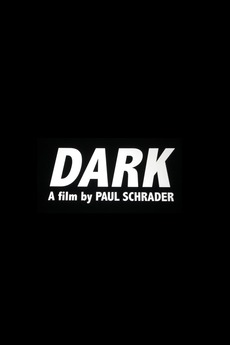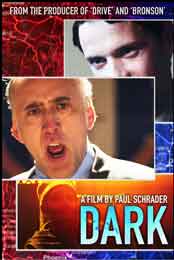 This is the closest thing that exists to a director’s cut of Paul Schrader’s DYING OF THE LIGHT (2014). That film was famously taken away from Schrader by its producers and re-edited, scored and distributed without its writer-director’s input. Thus what was intended as a highly subjective, kaleidoscopic depiction of madness ended up a thoroughly bland and uninspiring “thriller” that (despite dialogue like “You’ve got your hand so far up Obama’s ass you can’t see anything except his shit anymore!”) pleased nobody.
This is the closest thing that exists to a director’s cut of Paul Schrader’s DYING OF THE LIGHT (2014). That film was famously taken away from Schrader by its producers and re-edited, scored and distributed without its writer-director’s input. Thus what was intended as a highly subjective, kaleidoscopic depiction of madness ended up a thoroughly bland and uninspiring “thriller” that (despite dialogue like “You’ve got your hand so far up Obama’s ass you can’t see anything except his shit anymore!”) pleased nobody.
Thus what was intended as a highly subjective, kaleidoscopic depiction of madness ended up a thoroughly bland and uninspiring “thriller”…
Schrader has since disowned the film, as have its lead actors Nicolas Cage and (the late) Anton Yelchin, and also its executive producer Nicolas Winding Refn and cinematographer Gabriel Kosuth (who published a memorable article on Variety.com lamenting the film’s fate).
Full Film
With the 73-minute DARK (2017), Schrader, together with editor Benjamin Rodriguez, Jr. (who also edited Schrader’s DOG EAT DOG and FIRST REFORMED), performed an unauthorized three-years-after-the-fact recutting of the film utilizing work print DVDs (as the producers denied Schrader’s request to make a proper director’s cut with the original footage and sound). In essence, Schrader made his own fan edit, which, as an opening crawl makes clear, was “not created for exhibition or personal gain. It is for historical record.” Digital files of DARK currently reside in the UCLA film archives and the University of Texas, and will never be commercially released.
In essence, Schrader made his own fan edit, which, as an opening crawl makes clear, was “not created for exhibition or personal gain.
 The plot of DARK, unfortunately, isn’t much more invigorating than that of DYING OF THE LIGHT. It stars Cage as Evan Lake, a CIA agent suffering from frontal temporal dementia, a brain disease that causes disorientation and hallucinations. He’s obsessed with a Muslim terrorist named Muhammad Banir (Alexander Karim) who’s responsible for quite a few high profile kidnappings, and who was believed to have been killed years earlier. Mr. Banir also has a hereditary blood disease that is slowly killing him in a manner not dissimilar to Evan’s brain disease.
The plot of DARK, unfortunately, isn’t much more invigorating than that of DYING OF THE LIGHT. It stars Cage as Evan Lake, a CIA agent suffering from frontal temporal dementia, a brain disease that causes disorientation and hallucinations. He’s obsessed with a Muslim terrorist named Muhammad Banir (Alexander Karim) who’s responsible for quite a few high profile kidnappings, and who was believed to have been killed years earlier. Mr. Banir also has a hereditary blood disease that is slowly killing him in a manner not dissimilar to Evan’s brain disease.
Evan and a sympathetic fellow agent (Yelchin) travel to Romania, where a doctor is located who supplied Banir with drugs, and then to Africa, where Banir is said to be afoot. Unfortunately this does nothing to alleviate the symptoms of Evan’s dementia, and he finds himself having trouble performing routine acts like finding the hotel where he’s staying. He ultimately poses as a doctor, and so is let into Banir’s private lair, where everything really goes kablooey.
DARK has been called an “avant-garde provocation,” but for much of its runtime it plays like the routine potboiler it began as, albeit with flashes of NATURAL BORN KILLERS-like experimentation (and no wonder, as Benjamin Rodriguez previously worked as an apprentice to NBK’s co-editor Hank Corwin). A more accurate description, I believe, comes from DYING OF THE LIGHT’S editor Tim Silano, who calls DARK “a flawed picture (that was) made in hindsight from a bruised ego and at best is an experimental movie.”
“a flawed picture (that was) made in hindsight from a bruised ego and at best is an experimental movie.”
 Among the “experimental” elements are echoing dialogue, varying image quality (with scenes recorded off monitors by an iPhone and then inserted into the mix), intrusive jump cuts and, in the final scenes, a riot of psychedelic visual effects that overwhelm the narrative altogether. Schrader was clearly less interested in the plot in which his protagonist finds himself caught up than in his deteriorating mental state—the details of which are filled in via perfunctory narration that sounds like it was delivered like Ethan Hawke (the star of FIRST REFORMED). Characterization is virtually nonexistent, as all extraneous details and subplots (such as a romance between Cage and Irene Jacob as a fellow agent) have been excised from DARK.
Among the “experimental” elements are echoing dialogue, varying image quality (with scenes recorded off monitors by an iPhone and then inserted into the mix), intrusive jump cuts and, in the final scenes, a riot of psychedelic visual effects that overwhelm the narrative altogether. Schrader was clearly less interested in the plot in which his protagonist finds himself caught up than in his deteriorating mental state—the details of which are filled in via perfunctory narration that sounds like it was delivered like Ethan Hawke (the star of FIRST REFORMED). Characterization is virtually nonexistent, as all extraneous details and subplots (such as a romance between Cage and Irene Jacob as a fellow agent) have been excised from DARK.
The film’s biggest problem, aside from a typically overwrought lead performance by Cage, is the very one that afflicted DYING OF THE LIGHT: the cheap, straight-to-DVD look that tends to afflict Schrader’s worst films (such as FOREVER MINE and THE CANYONS). The blame here is most likely with DYING OF THE LIGHT’S producers, who “lightened up” cinematographer Gabriel Kosuth’s dark-hued imagery considerably, a problem Schrader was unable to fully rectify. Yet for all that DARK is the ideal presentation of this material, being far, far preferable to DYING OF THE LIGHT.
Vital Statistics
DARK
Director/Screenwriter: Paul Schrader
Cinematography: Gabriel Kosuth
Editing: Benjamin Rodriguez, Jr.
Cast: Nicolas Cage, Anton Yelchin, Alexander Karim, Irene Jacob, Tomiwa Edun, Aymen Hamdouchi, Claudius Peters, Robert G. Slade, Ethan Hawke
